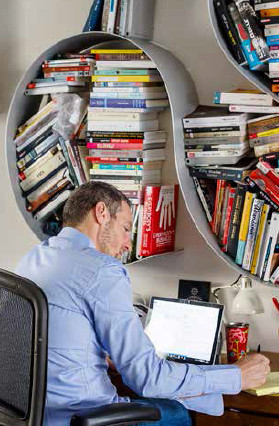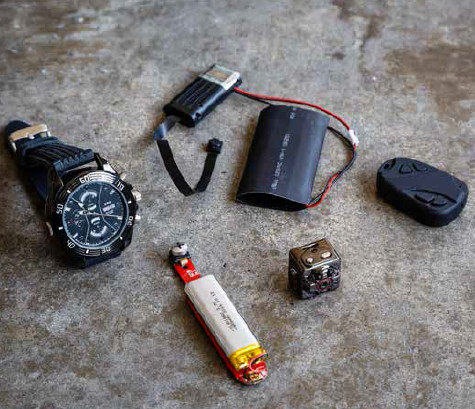Published: Monday July 17 2017Israeli entrepreneur Oren Yakobovich has created Videre est Credere, a human rights organisation which helps communities to film and document the violence and corruption they experience, and distributes the material to create change.From his childhood, Oren Yakobovich had always wanted to join the Israeli defence forces. His parents had immigrated to Israel in 1967, giving birth to him a few years later and bringing him up in a very patriotic house which believed that the country belonged to the Jewish people. At 18, he joined up, first as a pilot and then becoming an infantry officer serving mainly on the West Bank.But surprised at what he saw there, he began to understand the Palestinian cause for the first time and what Israel was doing to the Palestinian
Topics:
Perspectives Pictet considers the following as important: Human Rights, In Conversation With, Pictet Report, Pictet Report Summer 2017, Videre est Credere organisation
This could be interesting, too:
Perspectives Pictet writes House View, October 2020
Perspectives Pictet writes Weekly View – Reality check
Perspectives Pictet writes Exceptional Swiss hospitality and haute cuisine
Jessica Martin writes On the ground in over 80 countries – neutral, impartial and independent
Israeli entrepreneur Oren Yakobovich has created Videre est Credere, a human rights organisation which helps communities to film and document the violence and corruption they experience, and distributes the material to create change.
From his childhood, Oren Yakobovich had always wanted to join the Israeli defence forces. His parents had immigrated to Israel in 1967, giving birth to him a few years later and bringing him up in a very patriotic house which believed that the country belonged to the Jewish people. At 18, he joined up, first as a pilot and then becoming an infantry officer serving mainly on the West Bank.
But surprised at what he saw there, he began to understand the Palestinian cause for the first time and what Israel was doing to the Palestinian people. When growing up, he had known very little about what was happening on the West Bank and he decided that he didn’t want to serve there anymore. The occupation was not strengthening Israel’s security, he felt, but building up hatred for the future.
“I believed there was the potential to create peace without compromising our security. There was no need for us to be in cities intimidating youngsters and women, as happens when you give the army a policing role. I also saw what it was doing to my people – good people committing human rights violations in difficult situations.”
“So I refused to go on doing it, and I was jailed for a month which gave me time to think about how I could change the views of my people. I decided to create stories explaining what was happening on the West Bank by making film documentaries that would help my intelligent brothers and sisters to understand the need for change.”
He also made documentaries about social issues such as poverty, minority rights and the treatment of women. His films were well-received abroad and at film festivals, but he felt that he needed to do more to capture the reality of the people on the West Bank. He wanted them to be able to tell their own stories and say what they wanted to say.
“Instead of me going out there to film them, I thought I should give them the technology and training to help them tell their stories. So I analysed where there was suffering on the West Bank, where there was talent and gave 100 cameras to people living there. They came back with amazing images of violations of human rights and mistreatment in their daily lives, and the ‘Shooting Back’ film we made from them won awards and helped us bring perpetrators to court.”
“The next step was to move beyond Israel, and give cameras to oppressed communities around the world, so they could show us what we don’t see. I travelled under cover to Turkey, Africa and Asia to find out what was needed. And I moved to London where there was access to lots of resources for my research.”

He also formed a partnership with film-maker Uri Fruchtmann, a former husband of the singer Annie Lennox. They founded a charitable organisation called Videre est Credere – which means ‘to see is to believe’ – and they developed a four-step approach to their work:
- Engage with local communities, especially in rural areas where journalists rarely get to.
- Equip and train local activists so they can operate safely with cameras to film violations.
- Verify the images captured by the activists to avoid creating fake news which would undermine Videre’s work.
- Create impact by distributing the images to people who can change what is happening – whether they be decision-makers, lawyers or media organisations.
The cameras initially used in Israel in 2007 and 2008 were large – this was before everyone had smaller smartphones. The hundreds of cameras now used by Videre are even smaller still and can be hidden in everyday objects. Mostly produced in China, they can be bought online.
“Visual images are the best method of communicating, both for the mass media and to provide evidence for legal purposes. And spy cameras are now easily hidden in objects such as car keys, screws set in walls, stones, jewellery and clothing. They have apertures as small as a millimetre and they can film in high definition, and we can also record what is said. We might use dozens of cameras for specific projects.”
“We also customise our cameras and develop new ways of concealing them, using 3D printers to make what they are hidden in. Our laboratory does other kinds of research, such as tracking the routes used by people-traffickers for bringing people across borders to do forced labour. And with big data applications, it can analyse complex information to explore the structures behind violations and corruption.”
Projects are selected where Videre can bring most added value and have an impact. Some take years to complete, creating sustainable structures, training people and using their skills in different ways. But Videre always starts with massive amounts of research by its own research department working independently, investigating on the ground with its own cover stories.
It focuses on three issues:
– What information is needed – which might include documents, bank statements, accounts and social structures as well as visuals;
– Who will be involved on the ground to collect the information and verify it, and the techniques and equipment needed to do so;
– Which organisations should be used to distribute the information for maximum impact.
“For example, with a corruption investigation in Africa, we didn’t need to go there because we knew people were paying massive bribes. So our researchers spent a year and a half tracking down the details of who was involved and how money was being moved around. They identified people on the ground who could collect the necessary evidence, whether film, documents or anything else, verify it and then check it in case more work was needed.”

Videre is currently working in seven countries where it believes there is the impact potential to change things. Sometimes it will identify organisations that it can work with on the ground, teaching them how Videre works and training their people so that it can increase its global impact without having to open more offices.
The organisation centrally employs around 30 people with skills in information-gathering, communications, fund-raising, accountancy, technology and security. In local offices, people are recruited from the military, human rights and development organisations, and creative fields such as film-making. It has a £2 million budget, the majority of which is given by philanthropists. There is hardly any income from governments, except for specific projects.
A potential new source of funding is supporting investigation and audit processes used by local companies, many of whom are failing to take the right decisions in their overseas activities because they lack the right information. This makes it hard for them to uphold their corporate social responsibilities and acquire companies in places where Videre has the information and access.
“So we are creating a social impact business in parallel with our charity. We can see what’s happening upstream in remote areas and warn them if they’re drifting into a bad place – for example, into an area where slave labour is used. As a charity, we could increase our work if we can earn an income from this.”
One final point that Oren Yakobovich is keen to emphasise is that the organisation never takes credit for its work. ‘People see our work in the media all the time and hear of it in court cases. Often when I’m talking to people about an issue, they say Videre is not needed because work is already being done on it.
“But what they are talking about is our work, our verification and our processes – and we never say it was us to protect the security of our teams and partners.”
